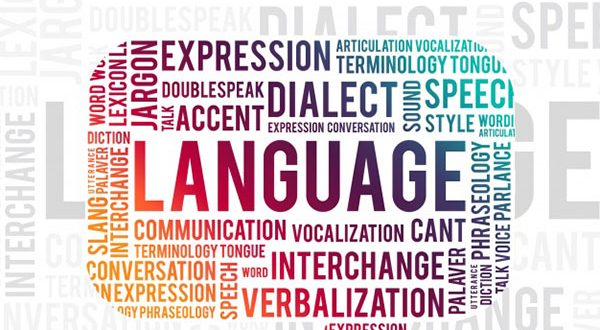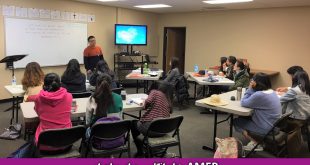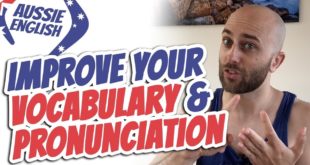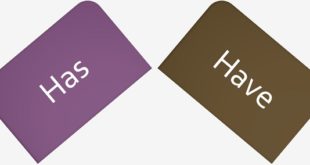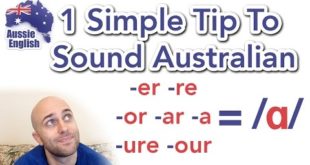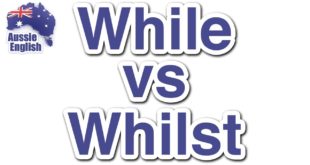] teach you how the pronunciation of “What Do I” and “What am I” changes when English speakers speak at a natural speed.
Pronunciation – What Do I & What Am I
G’day guys. Welcome to this episode of Aussie English. Today we’re going to do some more pronunciation stuff following on from what we covered last week, which was the episode on “What are you” and “what do you”. So, “What are you” and “What do you”. And today we’ll cover using the pronoun “I”. So, “What do I” and “What am I”.
What do I becomes Whad_deh why, and
What am I becomes Whad em eye.
Note: “Whad_deh why” and “Whad em eye” are just how I am spelling the phonetic pronunciation of how “What do I” and “What am I” are said when spoken quickly. You will never see them written like this in correct English.
So, it’s “Whad_dehwhy” and “Whad em eye”. There’s a slight difference there in the middle. “Whad deh why” and “Whad em eye”.
So, here are some examples of “What do I” plus a verb:
What do I do becomes Whad_deh why do,
What do I think becomes Whad_deh why think,
What do I say becomes Whad_deh why say, and
What do I talk about becomes Whad_deh why talk about.
So, you’ll see again how I mentioned last week too that it’s just a lot easier to say “What do I” if you push it together and it becomes a more fluid “Whad_deh why”, “Whad_deh why”, “Whad_deh why”. And remember that if you hear just the verb after the “Whad_deh_weh”, you know, you don’t necessarily have to analyse and break down the “Whad_deh why” into each individual word to know what the person’s talking about. An easy sort of cheat, and easy way of doing this is just hearing the verb afterwards and if it’s just “Do”, “Think”, “Say”, “Talk about”, you know that it’s “What DO I”, and if it ends in “-ING” you know that it was with the verb “To be”. So, the next section is with the verbs ending in “-ING”.
What am I doing becomes Whad em eye doing,
What am I thinking becomes Whad em eye thinking,
What am I saying becomes Whad em eye saying,
What am I talk about becomes Whad em eye talking about.
So, you hear that “Whad em eye” and then “Doing”, “Thinking”, “Saying”, “Talking about”. “Whad em eye”. Or you’ll hear “What do I”, “Whad_deh why” and “Do”, “Think”, “Say”, “Talk about”.
So, it’s just one of those things. Keep practicing it guys. Um… it’ll become a lot easier for you to speak as you learn to sort of push together these words and pronounce them a little more fluidly like this, and you’ll also, as a result of learning how to do it and practicing it, when you hear it you’ll naturally know what people are saying without having to sit there and think, “Okay, he said “what” and then he said “am” and then he said “I”, and that’s “Whad em eye” so that’s… I know what he’s talking about now!”. It’ll just become natural.
So, let’s go through some of the exercises here where I’ll just repeat the pronunciation change of “what do I”, “Whad_deh why” five times, and then I’ll do “what am I”, “Whad em eye” five times.
Whad_deh why x 5
And now I’ll do “What am I”.
Whad em eye x 5
And so now I’ll read out those same sentences that we did earlier and you guys have to try and anticipate the pronunciation change. So, I’ll read it out well pronounced like “What do I do” and then I’ll give you a little bit of space for you to guess how to change that. So, “What do I do” and then you would say “Whad_deh why do” and then I’ll say the correct version afterwards.
What do I do.
Whad_deh why do
What do I think
Whad_deh why think
What do I say
Whad_deh why say
What do I talk about
Whad_deh why talk about
What am I doing
Whad em eye doing
What am I thinking
Whad em eye thinking
What am I saying
Whad em eye saying
What am I talking about
Whad em eye talking about
So, that’s the episode for today guys. I’m going to follow on and I’m going to try and cover all the different pronouns with this sort of from of “What do” and then “What am” or “What are” or “What is”. And, so hopefully it helps you guys in your fluidity of spoken English. Anyway, talk to you soon. Have a good one.
 ایرانیان استرالیا Australia Iran بزرگترین جامعه ایرانیان ساکن استرالیا Australia Iran
ایرانیان استرالیا Australia Iran بزرگترین جامعه ایرانیان ساکن استرالیا Australia Iran

